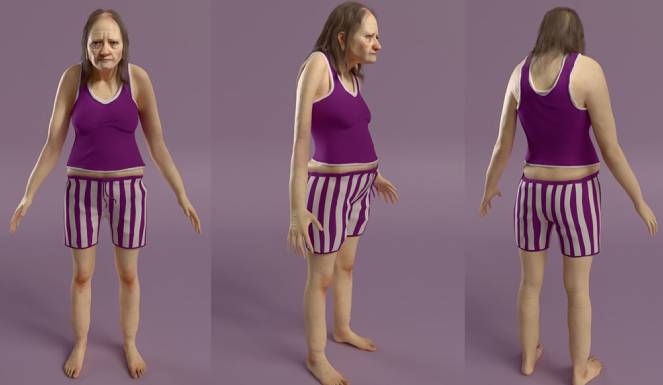A digital model, created by health and design experts, reveals what humans could look like in 2050 if the worrying trend of sleeping less hours than recommended continues. This figure, known as “Hannah,” exposes the devastating physical and mental effects of chronic sleep deprivation.
Are you getting enough sleep?
According to recent studies, many people sleep just 6 hours and 20 minutes per night, well below the 7 to 9 hours recommended to maintain optimal health. Insufficient rest affects key functions of the body, from cell regeneration to emotional balance, experts say. This simple daily act has a greater importance than many think.
The average sleep has decreased:
In the era of digital overload, endless work days and the constant distraction of screens, many people adopted the habit of sleeping less hours than recommended. To powerfully illustrate what could happen to our bodies if we continue with this trend, a team of health and design experts from Bensons for Beds created a digital model called “Hannah.” The experts describe what this 45-year-old woman would look like living in 2050.
Her image, which shows the devastating effects of sleep deprivation, is a stark reminder of the chronic problems that can develop from not getting enough rest. This visualization is based on 19 academic studies published since 2010 that analyze the impacts of sleep deprivation on the human body.

Among the effects of sleep deprivation we can highlight:
- Chronic back pain and muscle problems: During sleep, our body releases growth hormones and other compounds that are essential for muscle recovery. If we do not get enough sleep, these repair processes are severely affected.
- Muscle atrophy: Because the hormones that promote muscle growth are not produced properly, Hannah's muscles shrink and lose strength.
- Hair loss and aging skin: Lack of sleep directly affects skin elasticity. During nighttime rest, the skin produces collagen, a key protein to keep it firm and wrinkle-free. Likewise, lack of nutrients and oxygen for the hair can lead to progressive baldness, an increasingly common problem among people who sleep little.
- Weight gain and hormonal imbalance: Lack of rest disrupts the balance of two key hormones: leptin and ghrelin. Leptin is the hormone that signals the brain when we are satisfied, while ghrelin stimulates hunger. With insufficient sleep, leptin levels decrease and ghrelin levels increase, leading to increased appetite and late-night eating or cravings. In addition, lack of sleep disrupts insulin regulation, which can increase the risk of developing type 2 diabetes and obesity, according to various studies analyzed by the team. Sleep deprivation affects the body's ability to properly process food, contributing to weight gain. In addition, there is an increase in the secretion of cortisol, the stress hormone.
- Heart problems and swelling in the legs: Lack of sleep can trigger heart disease, hypertension and a higher chance of heart attacks. In this case, swelling in the legs is a sign of advanced heart disease, as heart failure hinders blood circulation, causing fluid build-up in the ankles, legs and feet. This type of swelling, known as edema, is a manifestation that the heart is not pumping blood efficiently, which can increase blood pressure and cause a build-up of sodium in the body.
- Memory loss: During sleep, our brain performs a process called memory consolidation, which is essential for storing what we have learned during the day. The hippocampus, the region of the brain responsible for forming new memories, is seriously affected when we do not get enough sleep.
Sleep is not just rest:
It is a complex process divided into several stages that allow the body and brain to recover.
- During the early stages of sleep, the parasympathetic nervous system is activated, reducing heart rate and blood pressure. These early phases are crucial for muscle tissue repair and cell regeneration.
- Then we reach the REM phase, where brain activity increases. This phase is especially important for learning, memory, and higher cognitive functions. During this process, dreams occur and the brain processes information acquired during the day. However, if we disrupt this cycle with bad habits, such as consuming alcohol or caffeine before sleep, the body cannot complete these phases effectively. This causes an imbalance that can affect our cognitive, emotional, and physical abilities. The importance of sleeping well goes far beyond simply “feeling rested.” The body needs to fulfill each of these phases to stay healthy, and any interruption can have consequences that manifest themselves in both the short and long term.
Sleep is not a luxury, it is a necessity. Don't wait for the effects of sleep deprivation to impact your health before taking action.
“Hannah is a wake-up call for people to take their rest seriously and preserve their health,” concluded Lisa Richards, of Bensons for Beds.
Learn to recognize the importance of rest and start making conscious decisions to improve your quality of life.


